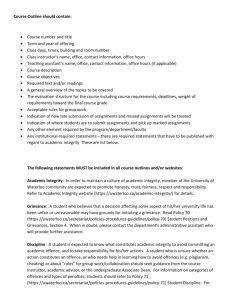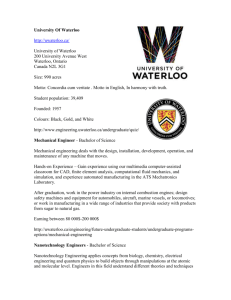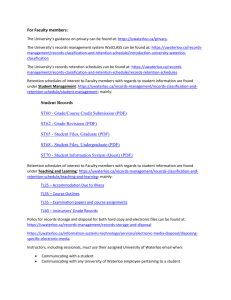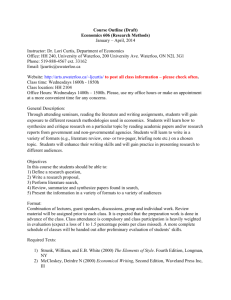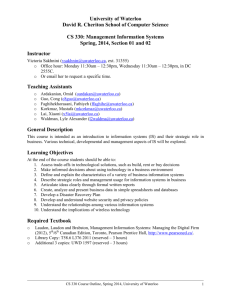University of Waterloo Department of Economics ECON 202-004
advertisement
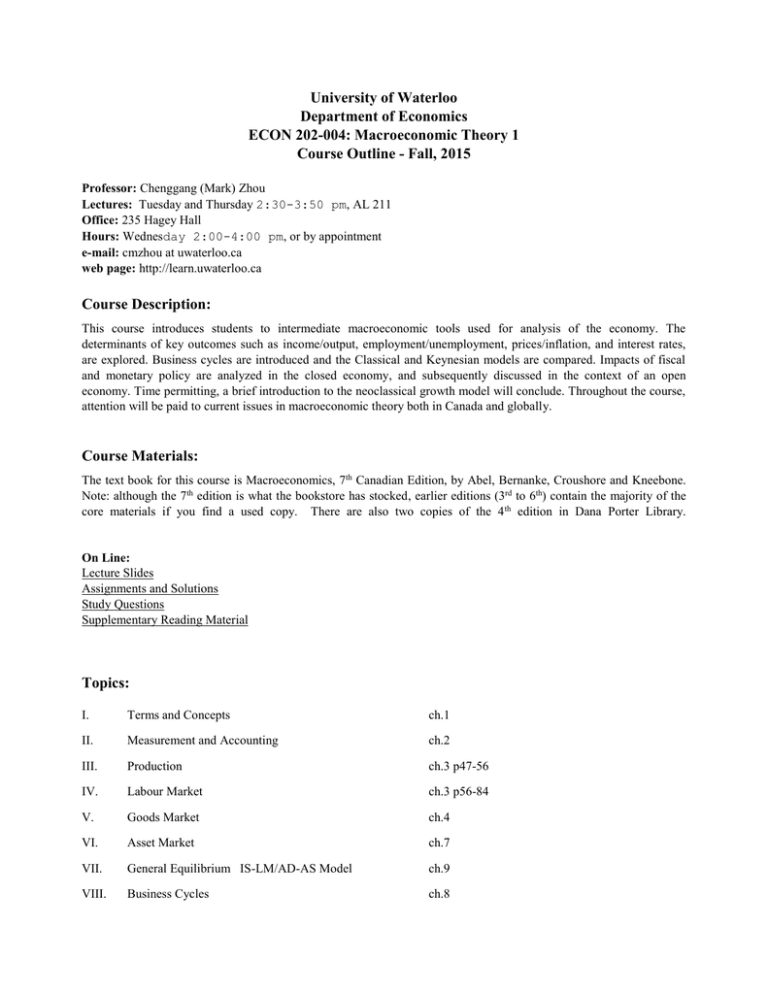
University of Waterloo Department of Economics ECON 202-004: Macroeconomic Theory 1 Course Outline - Fall, 2015 Professor: Chenggang (Mark) Zhou Lectures: Tuesday and Thursday 2:30-3:50 pm, AL 211 Office: 235 Hagey Hall Hours: Wednesday 2:00-4:00 pm, or by appointment e-mail: cmzhou at uwaterloo.ca web page: http://learn.uwaterloo.ca Course Description: This course introduces students to intermediate macroeconomic tools used for analysis of the economy. The determinants of key outcomes such as income/output, employment/unemployment, prices/inflation, and interest rates, are explored. Business cycles are introduced and the Classical and Keynesian models are compared. Impacts of fiscal and monetary policy are analyzed in the closed economy, and subsequently discussed in the context of an open economy. Time permitting, a brief introduction to the neoclassical growth model will conclude. Throughout the course, attention will be paid to current issues in macroeconomic theory both in Canada and globally. Course Materials: The text book for this course is Macroeconomics, 7th Canadian Edition, by Abel, Bernanke, Croushore and Kneebone. Note: although the 7th edition is what the bookstore has stocked, earlier editions (3rd to 6th) contain the majority of the core materials if you find a used copy. There are also two copies of the 4 th edition in Dana Porter Library. On Line: Lecture Slides Assignments and Solutions Study Questions Supplementary Reading Material Topics: I. Terms and Concepts ch.1 II. Measurement and Accounting ch.2 III. Production ch.3 p47-56 IV. Labour Market ch.3 p56-84 V. Goods Market ch.4 VI. Asset Market ch.7 VII. General Equilibrium IS-LM/AD-AS Model ch.9 VIII. Business Cycles ch.8 IX. Classical versus Keynesian ch.11,12 X. Unemployment and Inflation ch.13 XI. Open Economy Macroeconomics ch.5,10 XII. Monetary and Fiscal Policy ch.14,15 Approximately one week will be spent on each topic. Comments and further reading suggestions will be available on the course web page. Students are advised to check this page frequently, particularly when preparing for assignments or exams. Course Requirements and Grading Scheme: Assignment 1 (10%) Thursday, October 8 Mid-Term (in class) (30%) Thursday, October 29 Assignment 2 (10%) Thursday, November 19 Final Exam (50%) *TBA The Rules for ECON 202: Assignments must be submitted at 2:30 pm, in class, on the due date. Any missed or late assignments will have their weight automatically transferred to the final exam, provided you have completed sufficient coursework. If you miss the mid-term, the weight of this test will automatically go to your final exam. No make-up will be held. If you do better on the final exam than on the mid-term, I will automatically shift the weight of the mid-term to your final exam, provided you have completed sufficient coursework. A student who misses the Final Exam may submit a request to write a make-up (deferred) exam. The make-up exam will be substantially different than that written by the rest of the class. Any student who fails to write the deferred exam will automatically receive a grade of zero on that exam. Please carefully read the deferred exam policy (link below). Economics Department Deferred Final Exam Policy Deferred Final Exam Policy found at https://uwaterloo.ca/economics/current-undergraduates/policies-andresources/deferred-final-exam-policy. Cross-listed course Please note that a cross-listed course will count in all respective averages no matter under which rubric it has been taken. For example, a PHIL/PSCI cross-list will count in a Philosophy major average, even if the course was taken under the Political Science rubric. Academic Integrity Academic Integrity: In order to maintain a culture of academic integrity, members of the University of Waterloo are expected to promote honesty, trust, fairness, respect and responsibility. Discipline: A student is expected to know what constitutes academic integrity, to avoid committing academic offences, and to take responsibility for his/her actions. A student who is unsure whether an action constitutes an offence, or who needs help in learning how to avoid offences (e.g., plagiarism, cheating) or about “rules” for group work/collaboration should seek guidance from the course professor, academic advisor, or the Undergraduate Associate Dean. When misconduct has been found to have occurred, disciplinary penalties will be imposed under Policy 71 – Student Discipline. For information on categories of offenses and types of penalties, students should refer to Policy 71 Student Discipline (https://uwaterloo.ca/secretariat-general-counsel/policies-procedures-guidelines/policy-71) Grievance: A student who believes that a decision affecting some aspect of his/her university life has been unfair or unreasonable may have grounds for initiating a grievance. Read Policy 70 - Student Petitions and Grievances (https://uwaterloo.ca/secretariat-general-counsel/policies-procedures-guidelines/policy-70), Section 4. Appeals: A student may appeal the finding and/or penalty in a decision made under Policy 70 - Student Petitions and Grievances (other than regarding a petition) or Policy 71 - Student Discipline if a ground for an appeal can be established. Read Policy 72 - Student Appeals (https://uwaterloo.ca/secretariat-general-counsel/policies-proceduresguidelines/policy-72). Other sources of information for students: Academic Integrity website (Arts) https://uwaterloo.ca/arts/current-undergraduates/student-support/ethical-behaviour Academic Integrity Office (UWaterloo) https://uwaterloo.ca/academic-integrity/ Accommodation for Students with Disabilities Note for students with disabilities: The AccessAbility Services office (https://uwaterloo.ca/disability-services), located on the first floor of the Needles Hall extension, collaborates with all academic departments to arrange appropriate accommodations for students with disabilities without compromising the academic integrity of the curriculum. If you require academic accommodations to lessen the impact of your disability, please register with the AS office at the beginning of each academic term. If you are using Turnitin in your course Turnitin.com: Plagiarism detection software (Turnitin) will be used to screen assignments in this course. This is being done to verify that use of all material and sources in assignments is documented. In the first week of the term, details will be provided about the arrangements for the use of Turnitin in this course. Note: students must be given a reasonable option if they do not want to have their assignment screened by Turnitin. See Turnitin at Waterloo for more information. (https://uwaterloo.ca/academic-integrity/integrity-waterloo-faculty/turnitinwaterloo)
